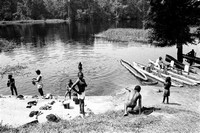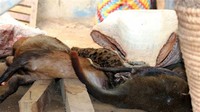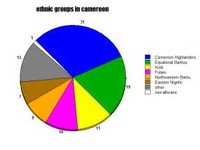Facts about Cameroon

Cameroon is a member of both the Commonwealth of Nations and La Francophonie.

Cameroonian Pidgin English is the most common lingua franca, especially in the formerly British-administered territories.

In 1997, Cameroon established anti-corruption bureaus in 29 ministries, but only a quarter became operational, and in 2006, Transparency International ranked Cameroon as the 138th most corrupt of 163 countries.

The constitution divides Cameroon into ten semi-autonomous regions, each under the administration of an elected Regional Council.

Cameroon's natural resources are better suited to agriculture and forestry than to industry.

Tourist literature describes Cameroon as "Africa in miniature" because it exhibits all major climates and vegetation of the continent: Coast, desert, mountains, rainforest, and savanna.

Power lies firmly in the hands of the president, Paul Biya, and his Cameroon People's Democratic Movement, and corruption is widespread.

In British Cameroons, the question was whether to reunify with French Cameroun or join Nigeria.

Cameroon is part of the Bank of Central African States and the Customs and Economic Union of Central Africa (UDEAC).

The southern part of British Cameroons merged with it in 1961, to form the Federal Republic of Cameroon.

The territory of present-day Cameroon is believed to have been settled for some fifty thousand years.

Rapids and waterfalls obstruct the southern rivers, but these sites offer opportunities for hydroelectric development and supply most of Cameroon's energy.

Nevertheless, in practice, the industry is one of the least regulated in Cameroon.

Cameroon is divided into five major geographic zones distinguished by dominant physical, climatic, and vegetative features.

The country was renamed the United Republic of Cameroon in 1972 and the Republic of Cameroon in 1984.

The commercial bush meat trade has now surpassed deforestation as the main threat to wildlife in Cameroon.

The Republic of Cameroon is a "hinge" state bridging central and western Africa.

Both monogamous and polygamous marriages are practiced, and the average Cameroonian family is large and extended.

Cameroon is one of the few tropical countries to have competed in the Winter Olympics.

Cameroon possesses substantial mineral resources, but these are not extensively mined.

The rest of Cameroon's energy comes from oil-powered thermal engines.

Cameroon's population is almost evenly divided between urban and rural dwellers.

Each of Cameroon's ethnic groups has its own unique cultural forms.

Cameroon turned to foreign aid, cut government spending, and privatized industries.

Reliance on agricultural exports makes Cameroon vulnerable to shifts in their prices.

Bush meat, long a staple food for rural Cameroonians, is today a delicacy in the country's urban centers.

Cameroonian society is male-dominated, and violence and discrimination against women is common.

Cameroonian literature and film have concentrated on both European and African themes.

Traditional sports include canoe racing and wrestling, and several hundred runners participate in the 40 km (24.8 mi) Mount Cameroon Race of Hope each year.

The Logone flows northward into Lake Chad, which Cameroon shares with three neighboring countries.

Music and dance are an integral part of Cameroonian ceremonies, festivals, social gatherings, and storytelling.

Tourism is a growing sector, particularly in the coastal area, around Mount Cameroon, and in the north.

Between the 1400s and 1600s, Fulani people moved east and settled in northern Cameroon, where they established lamidats, political and religious units.

President Paul Biya's Cameroon People's Democratic Movement (CPDM) was the only legal political party until December 1990.

The southern rainforest has vast timber reserves, estimated to cover 37 percent of Cameroon's total land area.

Before the slave trade was abolished in 1807, an estimated seven hundred Cameroonians a year were sold into slavery.

Cameroon's legal system is largely based on French civil law with common law influences.

Cameroon's coastline lies on the Bight of Biafra, part of the Gulf of Guinea and the Atlantic Ocean.

Colonial-era writers such as Louis-Marie Pouka and Sankie Maimo were educated by European missionary societies and advocated assimilation into European culture as the means to bring Cameroon into the modern world.

The northern peoples are Sudanese ethnic groups, who live in the central highlands and the northern lowlands, and the Fulani, who are spread throughout northern Cameroon.

Cameroon has a high level of religious freedom and diversity.

Nigerian music has influenced Anglophone Cameroonian performers, and Prince Nico Mbarga's highlife hit "Sweet Mother" is the top-selling African record in history.

Estimates identify anywhere from 230 to 282 different ethnic and linguistic groups in Cameroon.

Cameroon is home to over 250 ethnic and linguistic groups, with the cultures of both the central and western regions mingling.

Cameroon borders Nigeria to the west; Chad to the northeast; the Central African Republic to the east; and Equatorial Guinea, Gabon, and the Republic of the Congo to the south.

War in the Central African Republic has driven more than twenty thousand refugees to Cameroon's Adamawa and East provinces since 2002.

An irregular chain of mountains, hills, and plateaus known as the Cameroon range extends from Mount Cameroon on the coast almost to Lake Chad at Cameroon's northern tip.

Cameroon's per-capita GDP (PPP) was estimated as US$2,421 in 2005, high for an African country.

After Germany's defeat, Kamerun became a League of Nations mandate and was split into French and British Cameroons.

The Cameroon national football team has been one of the most successful in the world since its strong showing in the 1990 FIFA World Cup.

More than 75 percent of Cameroon's industrial strength is located in Douala and Bonabйri.

When World War I broke out, the British and French who controlled neighboring colonies invaded Cameroon.

Literature and films during the next two decades concentrated more on wholly Cameroonian themes.



